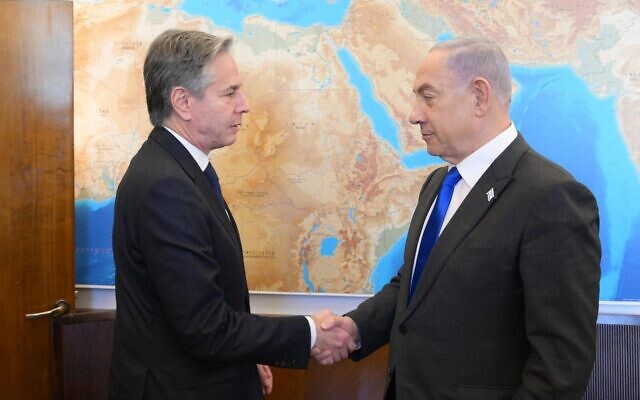Israel is going against the grain of international public opinion by refusing to countenance the eventual creation of a Palestinian state within the framework of a two-state solution.
Scores of countries, including Israel’s friends and allies, already recognize this as a geopolitical necessity, yet Prime Minister Benjamin Netanyahu’s far right-wing government is adamantly digging in its heels.
Since the Hamas massacre of October 7, the Israeli government has reiterated that recognition of a Palestinian state would be a “reward” for terrorism. This is widely seen as a justification for the unsustainable and untenable status quo.
Hamas, an opponent of a two-state solution, launched its deadly attack, in part, to focus world attention on the unresolved Palestinian problem, which has been simmering and boiling over for seven decades and has been the cause of virtually every war in the Middle East since 1948.
The gnawing Palestinian issue largely fell out of public view before October 7. But since then, it has gained tremendous traction. Even the United States, Israel’s chief ally, is invested in the two-state formula, which Netanyahu’s Likud Party has always rejected out of hand.
In a sign of the times, Spain, Norway and Ireland on May 22 announced they would recognize a Palestinian state later this month. This prompted Israel to recall its ambassadors from these countries and led Finance Minister Bezalel Smotrich to announce retaliatory measures.
Smotrich, the leader of the Religious Zionist Party, said that the transfer of tax funds would be cut off to the Palestinian Authority, which governs portions of the West Bank and is engaged in security cooperation with Israel there.
He called for the cancellation of a mechanism, devised by Norway, to facilitate the movement of salaries to Palestinian Authority employees in the Gaza Strip. And he demanded the approval of thousands of new settlement homes in the West Bank.
The announcement by Spain, Norway and Ireland, though mainly symbolic, came as Israel intensified its ground and air offensive in Rafah, Hamas’ last urban stronghold. According to reports, Israel has shelved plans for a major offensive in Rafah so as to allay U.S. concerns about its impact on Palestinian civilians. Israel will reportedly carry out a more limited operation in Rafah.

Israel has also resumed clearing operations in northern Gaza, where Hamas has regrouped.
The decision by Spain, Ireland and Norway was a rebuke to Israel, a tangible indication of the international community’s impatience with its 57-year occupation of the West Bank.
In explaining their rationale for recognizing Palestinian statehood, the Spanish, Irish and Norwegian leaders said that Palestinian independence cannot be put on hold indefinitely, or be beholden to an Israeli government that utterly rejects a two-state solution.
Prime Minister Pedro Sánchez of Spain said he had been compelled to act because Netanyahu does not have a plan for peace with the Palestinians. “The two-state solution is in danger,” he warned. “It’s time to move from words to action — to tell millions of innocent Palestinians who are suffering that we are with them, that there is hope.”
The prime minister of Norway, Jonas Gahr Store, had a similar message. “Palestinians have a fundamental, independent right to an independent state,” he declared.
The United States and most of its allies would concur with this notion, though they argue that Palestinian statehood should be the outcome of direct talks between Israel and Palestinian representatives.
Jake Sullivan, U.S. President Joe Biden’s national security advisor, was in Israel a couple of days ago to underscore this point.
Prior to visiting Israel, Sullivan conferred with Crown Prince Mohammed bin Salman of Saudi Arabia to discuss a possible agreement that could alter the political landscape of the region.
Under its broad terms, the United States and Saudi Arabia would sign a mutual defence pact and cooperate on a civilian nuclear program. Saudi Arabia and Israel, in turn, would normalize bilateral relations in exchange for a ceasefire in Gaza and Israel’s recognition of a “credible pathway” to Palestinian statehood that would “satisfy the aspirations and legitimate rights of the Palestinian people,” according to the official Saudi Press Agency.
Netanyahu, however, has stoutly resided such an arrangement.
U.S. Secretary of State Antony Blinken does not believe that Netanyahu will change his mind.

Yesterday, for the first time, he acknowledged that the Israeli government remains unalterably opposed to a two-state solution. “The Saudis demand a cease-fire in Gaza and a pathway to a Palestinian state, and it may well be that Israel isn’t able, willing to proceed down this pathway,” he told the U.S. Congress.
Blinken urged Israel to “take advantage of this opportunity,” a diplomatic breakthrough in-the-making it has sought for decades now.
Netanyahu himself has promoted this initiative, but is not willing to pay the price.
Israelis are understandably wary of Palestinian statehood after the horrors of October 7, but a demilitarized Palestinian state alongside Israel would be in Israel’s long-term security interests and a grievous body blow to Hamas and Iran.
